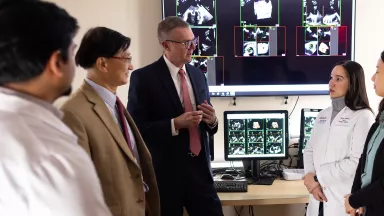Mitral Valve Regurgitation
At the Montefiore Einstein Center for Heart and Vascular Care, you can access exceptional care for mitral valve regurgitation. As a global leader in cardiovascular medicine and surgery, we are an academic-based, national and international referral site for high-risk and complex cases. For more than a century, we have been at the forefront in treating heart disease.
Ranked in the top one percent of all hospitals in the nation for Cardiology, Heart & Vascular Surgery according to U.S. News & World Report, our specialists are passionate about uncovering the latest diagnostic approaches and treatments that can improve outcomes. Backed by a multidisciplinary team of specialists, Montefiore Einstein continues to make advances in the treatment of heart disease. In recent years, we have expanded our programs in advanced cardiac imaging, heart failure and interventional cardiovascular medicine and assembled a world-renowned cardiothoracic surgical team.
When you trust us with your care, you can expect compassionate, personalized treatment plans that meet the highest standards for quality and safety. In addition, we offer patients a full choice of support services, from nutritional guidance to rehabilitative therapies.
When you need care for mitral valve regurgitation, turn to our dedicated providers who will develop a highly personalized treatment plan specific to you.
Montefiore Einstein offers the following content from Healthwise’s health information library.
What is mitral valve regurgitation?
Mitral valve regurgitation is a problem that happens when the mitral valve does not close tightly enough. The closed valve lets blood leak (regurgitate) from the lower chamber of the heart back into the upper chamber. Your heart has to work harder to pump this extra blood.
Primary mitral regurgitation happens when there is a problem with the shape of the valve. The shape is not normal.
Secondary regurgitation happens when another heart problem affects the heart muscle, typically in the lower left chamber of the heart. Changes in the heart muscle cause the valve to not close tightly. The shape of the valve is typically normal.
Small leaks usually aren’t a problem. But if the leak becomes severe over time, it may lead to heart failure.
The regurgitation usually develops over time (chronic mitral regurgitation). But sometimes it happens suddenly (acute mitral regurgitation). This is an emergency.
What causes it?
Primary mitral valve regurgitation may be caused by problems like mitral valve prolapse or calcium buildup on the mitral valve. Secondary regurgitation may be caused by coronary artery disease or heart failure. Acute regurgitation is caused by a problem that happens all of a sudden, such as a heart attack.
What are the symptoms?
Symptoms of chronic mitral valve regurgitation may take decades to appear. They include being tired or short of breath when you’re active. A heart murmur might be the first sign your doctor notices. Acute mitral regurgitation happens suddenly and is an emergency. Symptoms include severe shortness of breath, lightheadedness, and weakness, and chest pain.
How is it diagnosed?
When your doctor suspects that you have mitral valve regurgitation, you will be asked about your past health and have a physical exam. To diagnose the problem and check your heart, you’ll likely have an echocardiogram. You may have other tests to help your doctor see how well your heart is working.
How is mitral valve regurgitation treated?
For chronic mitral regurgitation, you may take medicines to treat problems caused by the regurgitation or to treat a heart problem that is causing it. Your doctor will check your heart regularly. You may choose to repair or replace the valve. For acute regurgitation, you likely need valve repair or replacement right away.
Symptoms of chronic mitral valve regurgitation may take decades to appear. They include being tired or short of breath when you are active.
Because you may not have symptoms, a specific type of heart murmur might be the first sign your doctor notices.
If you develop heart failure, you may have other symptoms. They include:
- Shortness of breath with activity. This can later develop into shortness of breath at rest and at night.
- Tiredness and weakness.
- A buildup of fluid in the legs and feet. This buildup is called edema.
Acute mitral valve regurgitation is an emergency. Symptoms come on quickly. They include severe shortness of breath, fast heart rate, lightheadedness, weakness, confusion, and chest pain.
When to Call a Doctor
Call 911 or other emergency services immediately if you have:
- Symptoms of a heart attack, including chest pain or pressure.
- Symptoms of a stroke.
- Loss of consciousness (syncope).
- Symptoms of acute mitral valve regurgitation including severe shortness of breath, fast heart rate, lightheadedness, weakness, confusion, and chest pain.
Call a doctor now if you have:
- Symptoms of heart failure, such as shortness of breath, fatigue, and swelling in the legs and feet.
- Mitral valve regurgitation (MR) and are having symptoms of infection such as fever with no other obvious cause. Be alert for signs of infection if you have recently had any dental, diagnostic, or surgical procedure.
- Irregular heartbeats.
- Fainting episodes.
- Palpitations.
- Shortness of breath.
- Been less able to exercise at your usual level.
- Excessive fatigue (without other explanation).
- Been coughing up blood.
Watchful waiting
Watchful waiting is a wait-and-see approach. If you don't have symptoms of MR, your doctor will still want to see you for regular checkups. Your doctor will want to see you as soon as you have symptoms for the first time. If your doctor has talked with you about what to do if you have symptoms, follow your doctor's instructions. Contact your doctor if your symptoms get worse.
When your doctor suspects that you have mitral valve regurgitation, you will be asked about your past health and have a physical exam.
To diagnose the problem and check your heart, you'll likely have an echocardiogram.
Your doctor may also order tests to check your heart. These tests may include an electrocardiogram, MRI, and cardiac catheterization.
Learn more
Treatment for chronic mitral valve regurgitation includes regular tests to check how well the valve and the heart are working. You may take medicine to treat problems caused by the regurgitation. Or you may take medicine to treat a heart problem that's causing it. Your doctor will likely recommend a heart-healthy lifestyle.
If your condition becomes severe, you may choose to have the valve repaired or replaced. You and your doctor can talk about a few things to decide. These things include the cause of the regurgitation, the anatomy of the valve, if you have symptoms, how well your heart is pumping blood, and your feelings about having surgery or a procedure.
Treatment for acute mitral valve regurgitation occurs while you are in the hospital or the emergency room. You need surgery right away to repair or replace the valve.
You can live a full and active life by doing things that help keep your heart and body healthy. Here's how.
- Have a heart-healthy lifestyle.
- If you smoke, try to quit. Medicines and counseling can help you quit for good. Avoid secondhand smoke too.
- Eat heart-healthy foods. These foods include vegetables, fruits, nuts, beans, lean meat, fish, and whole grains. Limit things that aren't so good for your heart, like sodium, alcohol, and sugar.
- Be active but don't start an exercise program on your own without talking with your doctor first. You may need some tests to see what kind and level of exercise is safe for you. Try for at least 30 minutes of activity on most days of the week. If activity is not likely to cause health problems, you probably don't have limits on the type or level of activity that you can do. If your condition is severe, your doctor will likely advise you to avoid strenuous activity.
- Stay at a healthy weight. Lose weight if you need to.
- Manage other health problems. These include diabetes, high blood pressure, and high cholesterol. If you think you may have a problem with alcohol or drug use, talk to your doctor.
- Take care of yourself.
- Call your doctor right away if you have new symptoms or symptoms that get worse.
- Go to your checkup appointments. And get the tests you need to assess your heart, such as echocardiograms.
- Take your medicines exactly as prescribed. Call your doctor if you think you are having a problem with your medicine.
- Practice good dental hygiene, and have regular checkups. Good dental health is especially important. That's because bacteria can spread from teeth and gums to the heart valves.
- Get a flu vaccine every year. And get a pneumococcal vaccine. If you've had one before, ask your doctor if you need another dose. Stay up to date on your COVID-19 vaccines.
- Talk with your doctor if you have concerns about sex and your heart. Your doctor can help you know if or when it's okay for you to have sex.
Learn more
Watch
If you have severe chronic mitral valve regurgitation, you may choose to have the mitral valve repaired or replaced. The goal is for blood to flow more normally through the valve. Valve repair may be done with surgery or a catheter procedure. Valve replacement is done with a surgery. You and your doctor can decide if repair or replacement is right for you.
Primary mitral valve regurgitation.
Valve repair may be done to help the valve work better. Or the valve may be replaced. Repair or replacement helps prevent damage to the heart that can be caused by the regurgitation.
Secondary mitral valve regurgitation.
Valve repair or replacement may be done to help relieve symptoms, help you live longer, and improve your quality of life. Repair or replacement cannot cure secondary mitral regurgitation because it is caused by another heart problem.
With acute mitral regurgitation, urgent repair or replacement surgery is usually needed.
Learn more
Watch
Current as of: June 24, 2023
Author: Healthwise Staff
Clinical Review Board
All Healthwise education is reviewed by a team that includes physicians, nurses, advanced practitioners, registered dieticians, and other healthcare professionals.





